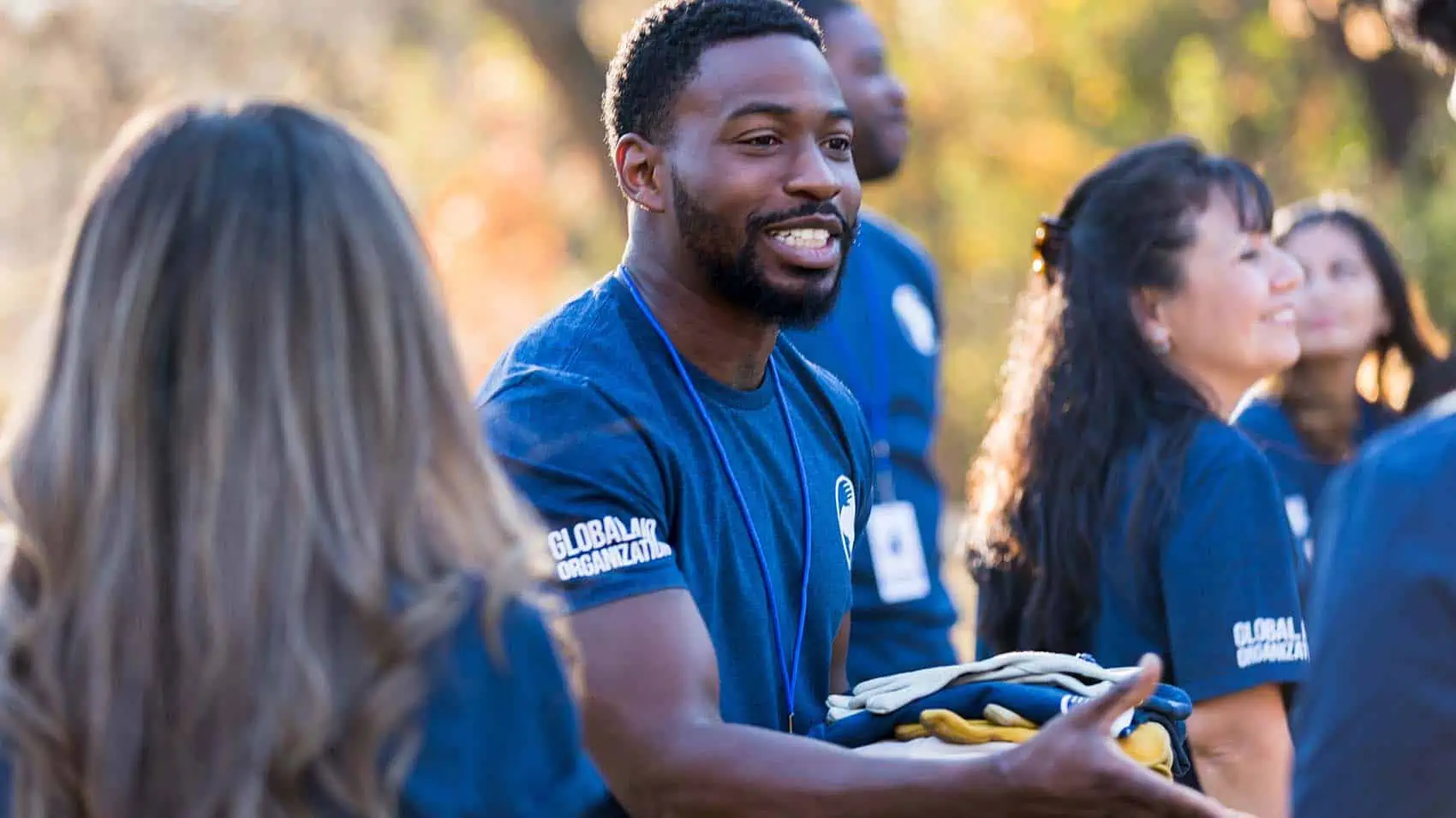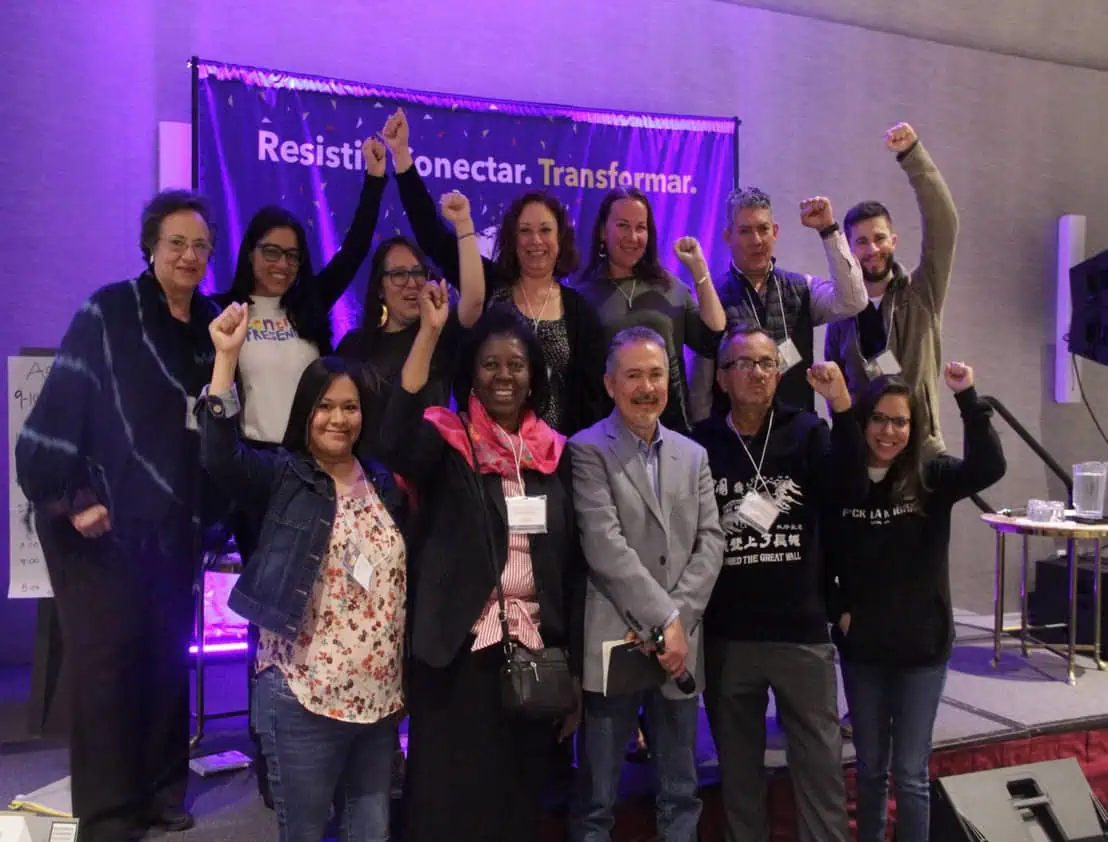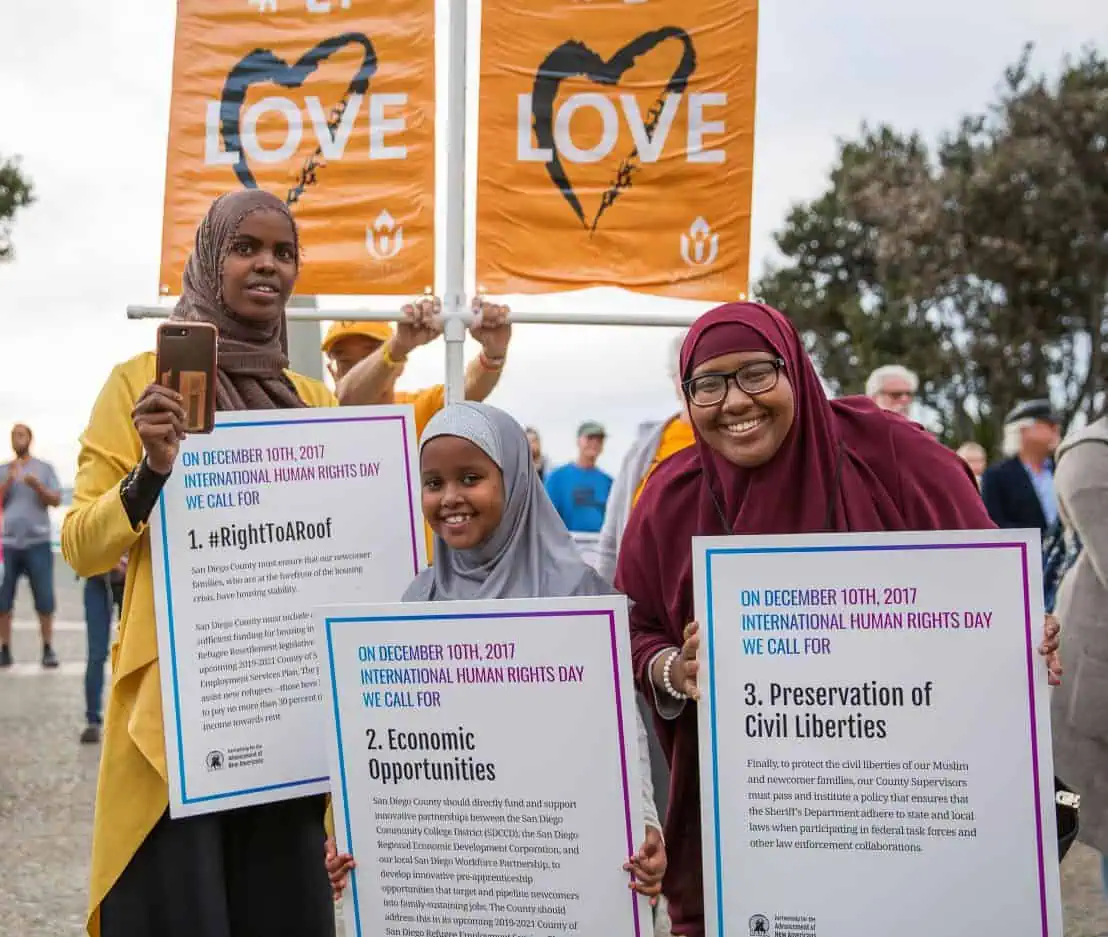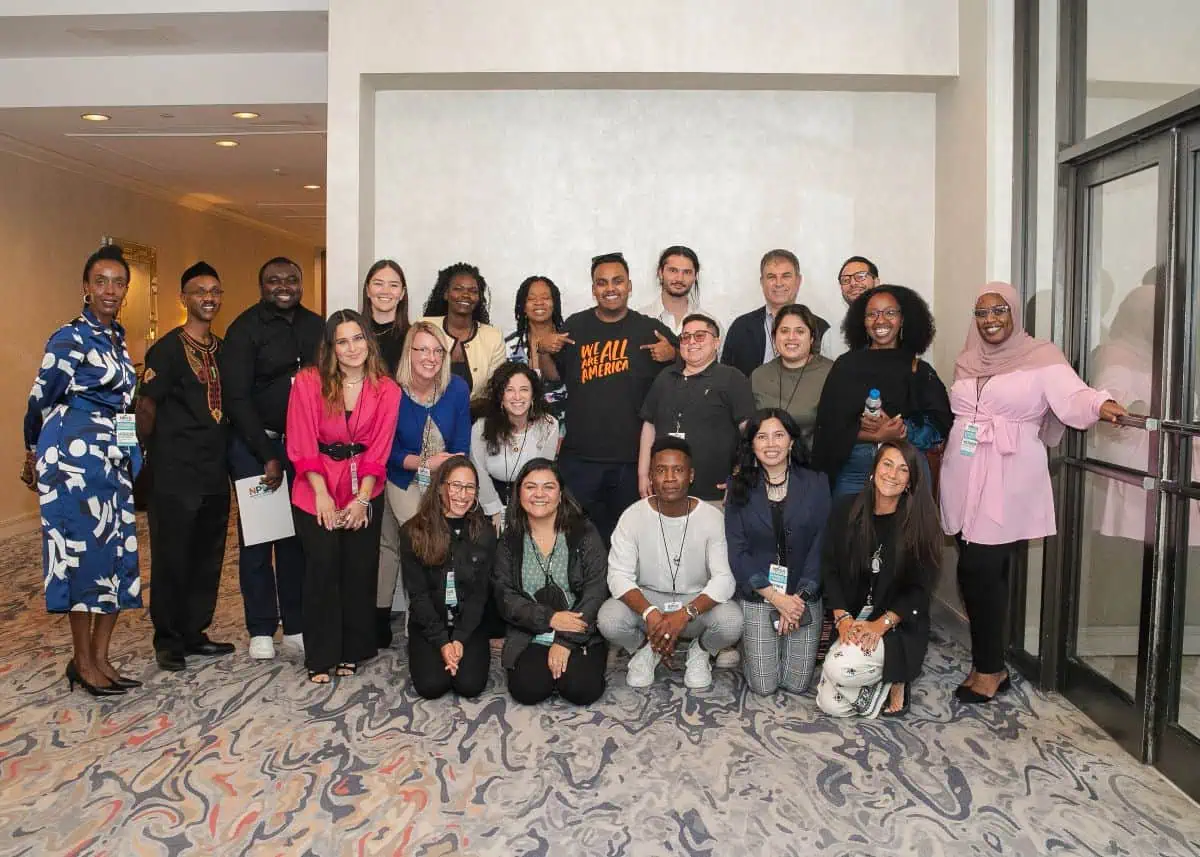Elevating Migrant Leadership: Building Inclusive Futures
This opportunity is now closed. This grantmaking initiative of the WES Mariam Assefa Fund seeks to shift power to where it belongs: to immigrants, refugees, and migrants who best understand the needs of their communities. It supports organizations in the United States that are amplifying the voices of local immigrant and refugee leaders to shape more effective programs and policies.

Background
How can we build inclusive futures for immigrants and refugees?
To design the Elevating Migrant Leadership initiative, WES took a participatory grantmaking approach, partnering closely with an advisory committee of leaders with immigrant and refugee experience and deep expertise in the field. This committee co-developed the initiative’s goals, focus areas, and criteria, and helped to select the final awardees.
Elevating Migrant Leadership launched as an open call funding opportunity in January 2024, and we were humbled to receive 364 applications from 43 states across the country. After a thorough review process with our advisory committee and WES staff, we are now proud to announce the 10 awardees who will be the recipients of a collective $1 million in flexible funding. All organizations are led by immigrants and refugees and show a strong commitment to advancing civic leadership and advocacy in their communities.
The Opportunity
Ten selected awardees will receive $100,000 grants and become grantee partners of the WES Mariam Assefa Fund. As part of the Fund’s partner community, each awardee will have access to peer-learning, capacity building, and other programming.
Funding is awarded to organizations with programs, current or developing, that focus on 2 out of 3 of the following areas:
- Narrative Building: Immigrants, refugees, and other migrants learn the best ways to build or shift prevailing narratives so that they are inclusive of their voices and perspectives.
- Experiential Learning: Immigrants, refugees, and other migrants increase their leadership capacity through applied learning experiences that help them build strategic development and decision-making skills.
- Mentorship: Immigrants, refugees, and other migrants forge relationships with mentors who can provide guidance and introduction to networks.
Advisory Committee
Community Sponsorship Hub
Basma Alawee
Community Sponsorship Hub
Basma Alawee is the Deputy Executive Director for the Community Sponsorship Hub. Prior to that she was the National Campaign Director for We Are All America at National Partnership for New Americans. Basma led organizing efforts in more than 21 states to push for policy changes and support for the inclusion of refugee and immigrant communities. But her impact doesn’t stop there. In 2019, she founded WeaveTales, an organization that develops storytelling training programs and amplifies the voices of over 300 refugees and immigrants.
Basma’s passion for advocacy is rooted in her own experiences as a former refugee from Iraq. Her tireless work has earned her numerous accolades including the Jacksonville EVE Award in 2020, Athena40’s “40 Under 40” in 2021, and Grant Thornton’s Purple Paladin in 2022. She is also co-designed and serves on the US Refugee Advisory Board, where she previously served as the first refugee advisor on the US Government Delegation to UNHCR’s annual Executive Committee.
Basma Alawee is a true champion for the rights of refugees and immigrants, using her own story to empower others and effect change on a national level. As a partner, leader and advocate, she is committed to centering lived experiences in inclusive policy design and decision-making. In her role, Basma creates space for diaspora communities and new actors to participate in the Welcome Corps and welcome refugee families arriving in America with the promise of freedom and opportunity.
Community Services Agency
Said Hassan
Community Services Agency
Said Hassan is a former Somali refugee turned community leader, serving as the co-founder and executive director of Community Services Agency Inc (COMSA). COMSA is a nonprofit organization in Brown County that serves refugees and immigrants. Leveraging his Master’s in Public Administration from the University of Wisconsin, Oshkosh, and his personal experiences, Said guides COMSA in providing strategic and empathetic support to these communities. His unique journey and leadership have made a significant impact, inspiring change and fostering inclusivity within the community.
National Partnership for New Americans
Nicole Melaku
National Partnership for New Americans
Nicole brings over a decade of experience working on immigrant and refugee issues at the local, state, and national level. As NPNA’s Executive Director, she works to harness the collective power of NPNA’s 66 member organizations across 40states to advance immigrant integration efforts through advocacy, organizing campaigns, and policy initiatives.
Nicole is a first generation New American whose mother and grandparents hail from Chihuahua, Mexico and who naturalized as a result of the Immigration Reform and Naturalization Act (IRCA) of 1986. Nicole’s career trajectory draws on the strength and perseverance of her family’s own immigration story-she is an advocate, organizer, and movement leader who is dedicated to building a more inclusive and fair democracy. She is a Welcoming America White House Champion of Change (2014), a Hispanic in Philanthropy Fellow (2018-19), a Transformative Leadership for Change Fellow, a New American Leaders alumni and former co-chair of the Fair Immigration Reform Movement (FIRM) and currently serves on the board of Conservation Colorado.
Encuentro
Andrea Plaza
Encuentro
Andrea Plaza is the founding Executive Director of Encuentro, a community-based non-profit in Albuquerque, New Mexico. She is a 30+ year resident of New Mexico with family roots in Colombia by way of North Carolina. Andrea holds a dual master’s degree in Latin American Studies and Community and Regional Planning from the University of New Mexico, and has 25 years’ experience working with the Latinx immigrant community in areas of adult education and economic development. Established in 2010, Encuentro’s mission is to transform NM into a thriving community for all of its residents by engaging with Latino immigrant families in educational and career development opportunities that build skills for economic and social justice.
The Welcoming Center
Manuel Portillo
The Welcoming Center
Manuel is the Director of Community Engagement at The Welcoming Center (TWC). TWC works to open doors of economic opportunity for immigrants of all education and skill levels and build immigrants’ individual and collective agency to address barriers to integration and wellbeing. Manuel is experienced in developing strategies for community engagement, and has expertise in immigrant social and economic inclusion, innovative approaches to civil engagement, and in building inclusive partnerships and policies. A refugee from Guatemala, he began work as a community organizer, addressing issues such as fair and equal treatment for asylum seekers.
Louisiana Organization for Refugees and Immigrants
Dauda Sesay
Louisiana Organization for Refugees and Immigrants
Dauda Sesay is the National Network Director at African Communities Together and Founder and Executive Director at the Louisiana Organization for Refugees and Immigrants.
Dauda fled Sierra Leone at age 16 due to a brutal war that led to the murder of his father and younger sister. While he was fleeing the military and the rebels, he was shot and seriously injured. In a refugee camp in the Gambia, he worked with other refugees to advocate for better living conditions and education for children. When his injury required further surgery, he moved to the capital, where he met his wife — also a refugee — and when his medical condition deteriorated, Dauda, his wife, and their six-month-old daughter were resettled to the U.S.
Today, Dauda serves as the Vice Chair Refugee Congress Board of Directors. He is also a founding member and President of the Louisiana Organization for Refugees and Immigrants, a nonprofit community-based organization that assists refugees and immigrants through their various stages of integration into the United States. He works with refugee families, coordinates help to New Americans during times of natural disasters and works to connect communities, amplify refugee voices, and build bridges.
Dauda is also a member of the Mayor Sharon Weston Broome International Relations Commission and Chairperson of the Commission on Culture and Art Engagement, a commission established to help make the City of Baton Rouge more inclusive and welcoming. He was recently appointed as the first refugee to serve as U.S. Advisor at the UNHCR High-Level Officials Meeting on Global Impact on Refugees in December 2021 and the Annual Tripartite Consultations on Resettlement in June 2022. Most recently, Dauda was among the first Advisors to serve on the United States Refugee Advisory Board.
Dauda received the 2021 Refugee Congress Excellence Award for Honorary Delegate. He has a degree in Applied Science in Process Technology from Baton Rouge Community College and is currently pursuing his bachelor’s degree in Administrative Management at Louisiana State University-Shreveport. Prior to joining ACT, he worked as a Process Technician at Dow Chemical. He recently received ACT Kofi Annan Award.
He is the proud father of five children. In his free time, he likes playing soccer, doing fun activities with children, and listening to music (afrobeats, Zydeco, and country). Dauda also watches American football and is a big fan of the New Orleans Saints and LSU Tiger.
Grantmakers Concerned with Immigrants and Refugees
Ivy O. Suriyopas
Grantmakers Concerned with Immigrants and Refugees
Ivy leads GCIR’s program and policy strategy and development, funder education and engagement, and funder mobilizing and organizing. Previously, she was a program officer at Open Society Foundations, where she focused on immigrant and refugee justice, managing a multimillion-dollar portfolio and developing a strategy challenging the systems rooted in the racialized treatment of immigrants throughout US history. Prior to joining OSF, she was an attorney and director of the Anti-Trafficking Initiative at the Asian American Legal Defense and Education Fund, working at the intersection of migrants,’ workers,’ and women’s rights, providing legal representation and advocating for policy changes informed by the lived experiences of her clients.
Welcoming America
Daniel Valdez
Welcoming America
Daniel Valdez (he/him) is Chief External Affairs Officer at Welcoming America. In his role he oversees the organization’s development, communications, marketing, and strategic partnerships. From 2015 – 2019 Daniel held roles in the programs team at Welcoming America, including Network Director. Prior to rejoining Welcoming America, Daniel served as the North Carolina and Mid-South Director for the Hispanic Federation. With more than a decade of nonprofit management experience, he is passionate about helping advance the mission of organizations and communities working on systemic changes to bring greater prosperity and opportunity for everyone.
Daniel’s work has centered around advocacy and education efforts on issues like civic engagement, immigrant rights, racial justice, health disparities, and economic mobility. Daniel holds a B.A. in History and Latin American Studies from the University of North Carolina at Charlotte and a certificate in Nonprofit Management from Duke University. He was born in Acapulco, Mexico and has called the Charlotte region home for almost 25 years. In his spare time Daniel enjoys hiking, cooking, spending time with friends and family, and exploring new cities.
Refugee Congress
Nili Yossinger
Refugee Congress
Nili Sarit Yossinger is the inaugural Executive Director for Refugee Congress, overseeing operations, and implementing communications, funding, capacity-building, advocacy, and partnerships strategies that fulfill the organization’s mission of ensuring that there are always refugees at the table as equal partners.
Prior to her work with Refugee Congress, Nili was a Research Project Manager at the Institute for the Study of International Migration (ISIM) and the Senior Vice President for Research at Georgetown University, where her projects included complex humanitarian emergencies and the intersections of forced migration, food security and environmental degradation in the Horn of Africa and Persian Gulf regions; and the use of open source data in predicting food supply chain shocks.
Most recently, Nili co-authored Integration Outcomes for Forcibly Displaced Persons (FDPs) A Holistic Co-Design Approach, a report from Refugee Congress, Refugee Council USA, and ECDC, that evaluates and proposes improved metrics for measuring integration, from the perspectives of forcibly displaced people.
Nili previously worked with the Capital Area Food Bank, the UN Refugee Agency in Washington, D.C., and Human Rights First. She holds a Bachelor of Arts in International Studies from Loyola University Chicago and a Master of Arts in German and European Studies from Georgetown University’s School of Foreign Service, along with a Certificate in Refugees and Humanitarian Emergencies from ISIM. She currently serves as an Advisor for Concordia, an organization that builds and sustains cross-sector partnerships for social impact, and in her free time is a longtime volunteer on the senior staff of American Model United Nations.
Evaluation Criteria
Does the organization’s program include 2 out of the 3 stated programmatic approaches – Narrative Building, Experiential Learning, or Mentorship?
Does the organization’s program help to shift and build narratives that are inclusive of immigrant and refugee voices? Does the organization’s program enhance leadership skills through applied learning experiences? Does the program provide this community with mentors as guidance and for networking opportunities?
Does the organization intentionally provide opportunities for community members to partner, build best practices, and learn from one another?
Does the organization have leadership representation that reflects the lived experience and identities of the communities the organization serves?
Is the organization’s work informed by the perspectives of community members and various levels of staff? Does the organization welcome and encourage feedback to guide decision-making, program design, and implementation?
How does the organization adapt to evolving community needs? How does the organization envision fulfilling its mission?










